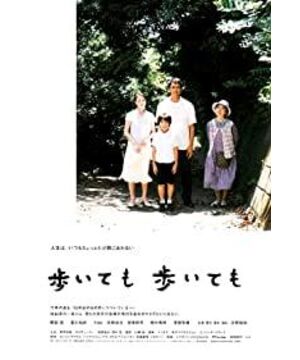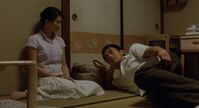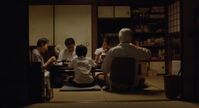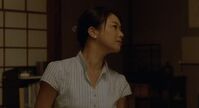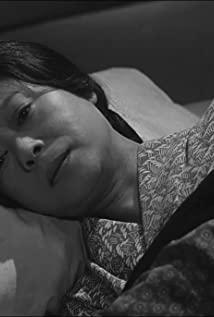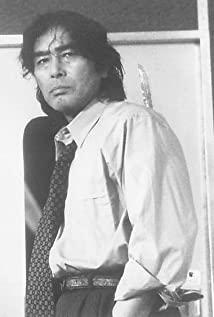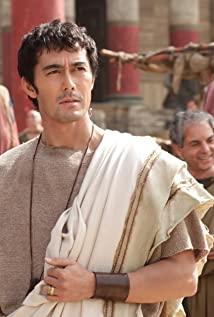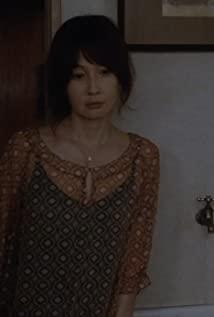When talking about Japanese literature, Mr. Mu Xin once commented: "I read these poems with forgiveness. They are very light, thin, and translucent. The paper is wooden and bamboo. Japanese. It is not Tang or Song. Nor is it the vernacular poetry of modern China. Calm and tranquil. There is no strength, depth, or wisdom there. You try to write it, but you can't write it. It's like their mustard, wooden slippers, and paper lanterns." After reading it, I felt really sharp, See the core of Japanese culture at a glance. This is true of Japanese literature, and so is Japanese film.
Watching Hirokazu-eda's movies, watching "Never Stop Walking", the sound, picture, rhythm, characters, and plot are presented in a slow and slow manner. The bits and pieces of daily life flow in your eyes, like a light watercolor. , light, natural, not dazzling, not jumping; outdoor sunshine, plain white sky and road, indoor shade, simple and old home, the director skillfully controls the film's movement through the transformation of light and shade and space. The rhythm, like the cool summer breeze by the sea, caresses and provokes your skin from time to time, so that people will not be depressed in this slow and dull feeling, but have a comfortable and transparent pleasure, because in such a short dialogue between parents , The storyline and the relationship between the characters are peeled off bit by bit, the personality of the characters, the helplessness of life, even if I miss it, I still keep walking, stealing things in the fleeting years is right and wrong, the road of life still has to go on like this... All these daily life situations, we see in our eyes, hear in our ears, feel something in our hearts, and feel something in our hearts, we can't help but feel a touch of sadness when we savor it carefully.
Life is pure joy. If Hirokazu Kore-eda represents the peak of the new aesthetics of Japanese cinema, then this kind of beauty is the "beauty of white porridge". It seems bland, vague, and innocent, but it is extremely skilled and precious, because the more white porridge, the more skillful it will be, and the more difficult it will be to cook. This natural taste will awaken your already dull taste buds, leaving your lips and teeth fragrant with a long aftertaste. At the London Film Festival, an audience member posed this question to Hirokazu Koreeda: "What kind of movie do you think is a good movie?" Hirokazu Koreeda thought about it and said, "I think a good movie is what makes people watch it. After the movie is over, it will be unforgettable for a long time, and it will truly change your life a little bit." Of course, this answer is very Hirokazu-eda. As a documentary director, he believes that film is not used to express himself, but to communicate with the world. He believes that "there is love in heaven and earth", and daily life itself is very beautiful. The director is to record these and convey it to the audience truly. As for how the audience feels and what kind of change it will bring to your life, it is necessary Experience it yourself. Therefore, everyone has a Hirokazu Koreeda in their hearts.
But if you want to look at it from the perspective of change, the audience thinks that the successor of Yasujiro Ozu's film is Hirokazu Kore-eda. While inheriting the film aesthetics of his predecessors, there is less sense of nihility in life and more warmth and hope. Therefore, his works often have the warm power to heal people's hearts. What people feel in his films is that in the trivial daily life, they find that the most precious things in life are precisely those details that are ignored by you but always stay with you. Just like this movie, the leisurely guitar soundtrack is like the sunshine in the lazy afternoon, the simple and fresh picture, the delicate plot and expression, inadvertently wet the eyes, making people feel the life and the movie. good.
In the traditional Japanese aesthetic consciousness, the lingering and haunting light sadness is an important aesthetic experience. "When the heart is moved, that is to know the sorrow of things." In this kind of sadness, one understands the emotion of all things. This is like the Japanese like to see cherry blossoms, one is in its beauty, and the other is in its fleetingness. This is also a manifestation of sadness, or it is precisely in the conflict between beauty and beauty that people gain an aesthetic experience. So in this sense, the protagonist in "Non-Stop" has a lot of things he should not say, what he should do, and he keeps walking on the road of life, but he is always slow. It is precisely because of so many regrets that people can cherish the trivialities of life, rely on love, and become calm in the continuation of life.
In Hirokazu Kore-eda, there are many movies that reflect the content of ordinary family life, especially movies like "Never Stop" that seem to have almost no plot conflicts on the surface, using plain images to show the most original taste of life in Japanese families, even if it has the most sensational The content of the story is still filmed in the most restrained way. For example, in "Never Stop Walking", the mother saw a yellow butterfly in the room, and insisted that it was a pure soul. After so many years, the mother's pain of losing her son still did not heal. The busy day made her have no time to care, only In this situation, under the cover of the night, when the family was reunited for a short time, the mother's heart was so sensitive to relax a little. I have to say, the performance of the tree Xilin is really wonderful. At that moment, it really made people feel a sense of time and space. The actor's lively and restrained performance, the camera moved slowly, the butterfly flew away, and many reminded the mother that it was time to take a bath. The mother suddenly woke up. ended. This is the most sensational paragraph in the whole film, but the director still controls the rhythm in an orderly manner, there is no intense action, no sensational language, no emotional explosion, only in a small space, under the dim light, elegant Flying yellow butterflies and mumblings of mothers. That faint sadness was slowly released little by little. Therefore, from the emotional level of film warmth, it is relatively easy for the audience to enter the situation of the film and experience the emotional expression in the aesthetic sense with empathy. Reflecting on the comparison between the film and reality, people show a beautiful and kind side in their hearts. That's the power people get in movies.
Still water runs deep. Like a peaceful flame is Hirokazu-eda's movie view. As the most master-like among Japanese film directors at present, Hirokazu Koreeda not only has formed a set of his own style system in the use of film language and the creation of aesthetic atmosphere, but also has a deep understanding of the power of softness in Eastern philosophy. Life is like the sea, the surface seems to be calm, but the seabed is often turbulent. The family gathers for a short time in a day, eats, sacrifices, sleeps, and talks. The director presents the real life fragments in front of you. Although three different families have conflicting personalities, for a harmonious atmosphere, Everyone is doing their best to perform. Fortunately, there is only one day before the big problem will pass. Everyone thinks this way, in their hearts. For example, a lot of wives told their wives not to tell their family about their unemployment on the way home; a lot of wives told their sons not to call a lot of names, at least not today; Talking to my mother about my brother's cemetery; a lot of wives and sons talk about taking him to see my father's cemetery next time; my father's unhappy heart because no one inherits his clinic; a lot of sisters and mothers talk about the house when my mother There are no positive rebuttals, clever diversions; many re-stick the torn doctor's essay paper; after dinner, many mothers sing the secrets they have kept in their hearts when they are young while many fathers take a bath Song, let the secret let it pass in time, just sing the song and keep moving forward; the details of each scene flashed in the film, understated, not surprised or happy, the past time, the present time, intertwined together. Slowly aftertaste, suddenly felt inexplicable touch, the world is difficult, everyone is a lonely walker. Just because there is concern in the heart and nostalgia for the fireworks in this world, everyone walks together and keeps walking.
This film is the most personal of Hirokazu Kore-eda's work. He said that he did not think about the so-called "era" and "world" when he made this film. I am so saddened by the death of my mother. If I don't use this form of memorial service, I don't think there's any way to go on. So I made the movie "This is not like a movie at all". It is precisely this most authentic and direct record that allows the audience to see the true face of life behind the veil of tenderness. Although not perfect, it is still moving. Therefore, this film has a relatively large response from the audience. Although it didn't touch on such grand themes as thinking about the times, this kind of inadvertent intervention made the audience happy. Because from the audience's point of view, what moves people the most is not the thrilling big scenes, but the heart-warming little fortunes, those imperfect but real lives. So, as the director said, the audience will see what they want from the movie. It's like "Why do I always take a beat when I keep walking?" For such a question, if we don't ask the reason, but just watch the result, then the result is: because I'm so slow, I miss it, and that's why I am what I am now. I. And there are no assumptions in life, and time cannot be turned back. If everyone falls into self-obsession, entangled in the dislocation of ideals and reality, and cannot let go, then we will always go on with regrets. And this may not be the life we want. The reason why people love Hirokazu Koreeda and Hirokazu Koreeda's films is precisely because Hirokazu Koreeda puts aside the decadence and nihilism that traditional Japanese aesthetics are used to, so that people can see that the world, although not perfect, is always wonderful. Let people experience meaning in the plain, see hope in the trivial, and let the light sadness accumulate into a warm force to move forward. Time is wasted and the world is noisy. Even if you miss out on the journey of life, you don't have to be afraid. As long as you keep walking, you will always be moved. Adjust your steps and we can move on. Just like those beautiful moments that suddenly flashed in the movie, it is as touching: the pink crape myrtle flowers touched by the children in the sun; Xiaodun made a wish to be a doctor to the night sky in the courtyard at night; many years later, many families On the way back from visiting their parents' tombs, many held their daughters' hands and told the story of the yellow butterfly that her mother had told countless times...
Let's walk forward as Hirokazu Kore-eda said in his essay "The Speed of Walking": not in a hurry or slow, walking without shock, walking with warmth and steadiness, until the heart is unexpectedly calm, As long as we keep walking, we will see how wonderful the world is, how beautiful everyday life is, and how life itself is a miracle.
View more about Still Walking reviews


